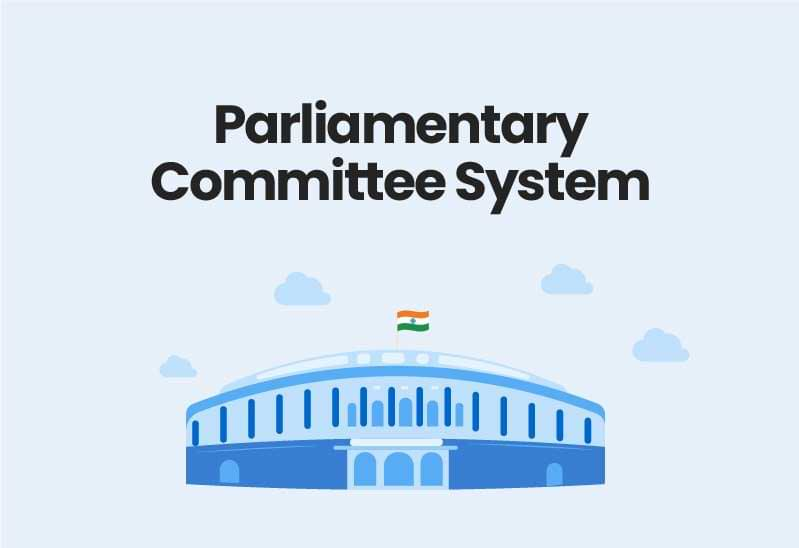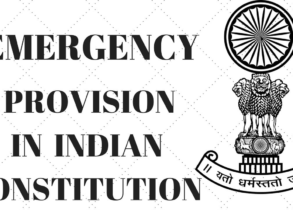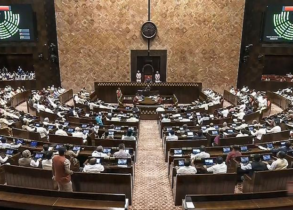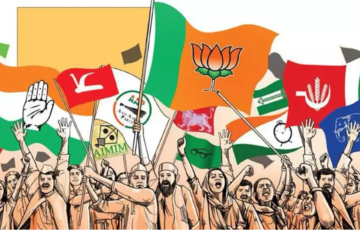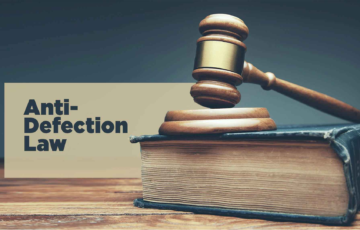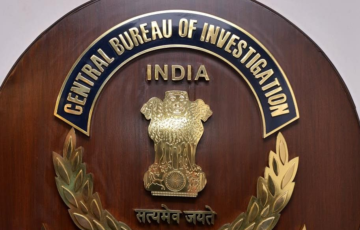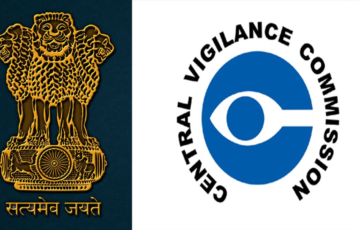PARLIAMENTARY COMMITTEES
Introduction
- The Indian Parliament is a massive and complex body that deals with a wide range of issues. It’s challenging for the Parliament to effectively deliberate on all matters due to its size, diversity of functions, and the limited time available. To assist in its duties, the Parliament relies on a number of committees. These committees are mentioned in the Constitution, but the Constitution doesn’t provide specific details about their composition, tenure, or functions. Instead, these matters are addressed in the rules of the two Houses of Parliament.
| Note: The consultative committees, while also comprised of Members of Parliament, do not meet all four of these criteria and, therefore, are not classified as parliamentary committees. These committees play a crucial role in assisting the Parliament in its legislative and oversight functions. |
Meaning
- Parliamentary committees are groups of members of parliament (MPs) who are appointed or elected to perform specific tasks. They are an important part of the parliamentary system of government, as they provide a forum for MPs to scrutinize the work of the government and to make recommendations on various issues.
Salient Features
- A parliamentary committee in India is a group that:
- Is either appointed, elected, or nominated by the House of Parliament or its Speaker/Chairman.
- Operates under the guidance and direction of the Speaker/Chairman.
- Submits its reports and findings to the House or directly to the Speaker/Chairman.
- Has a secretariat that is provided by the Lok Sabha or Rajya Sabha, the two Houses of Parliament.
Classification
- Parliamentary committees can be broadly divided into two types:
- Standing committees and
- Ad hoc committees.
- Standing committees are permanent committees that are constituted every year or periodically. They have a wide range of functions, including:
- Examining the work of different ministries and departments of the government
- Reviewing proposed legislation
- Making recommendations to the government on various issues
- Ad hoc committees are temporary committees that are appointed or elected for a specific purpose. They cease to exist once they have completed their task. Some examples of ad hoc committees include:
- Select committees on bills
- Joint committees on bills
- Committee on Public Accounts
- Committee on Estimates
- Committee on Petitions
Standing Committees
- In India, there are six different types of standing committees, mentioned below. They are indestructible in nature.
Financial committee
- Financial Committees are divided into three types:
Public Accounts Committee
- The Public Accounts Committee (PAC) is a standing committee of the Parliament of India. It is constituted every year by the Lok Sabha (lower house of Parliament) and the Rajya Sabha (upper house of Parliament). The PAC consists of 15 members from the Lok Sabha and 7 members from the Rajya Sabha. The Chairperson of the PAC is appointed by the Speaker of the Lok Sabha.
- The PAC is responsible for examining the accounts of the Government of India and reporting on any irregularities. The PAC also examines the reports of the Comptroller and Auditor General of India (CAG) and makes recommendations to the government.
- The PAC is an important committee of Parliament, as it plays a vital role in ensuring that the government is accountable to the people. The PAC’s reports are often used by the opposition to criticize the government and to demand corrective action.
- Some of the important functions of the PAC are:
- To examine the accounts of the Government of India and report on any irregularities.
- To examine the reports of the CAG and make recommendations to the government.
- To ensure that the government is accountable to the people in the use of public funds.
- To prevent wastage and misuse of public funds.
- To improve the efficiency and effectiveness of the government’s financial management.
- The PAC has played an important role in exposing a number of financial irregularities and scams in India.
- For example, the PAC played a key role in exposing the 2G spectrum scam, the Coalgate scam, and the Commonwealth Games scam.
- The PAC is an important institution in the Indian democracy. It plays a vital role in ensuring that the government is accountable to the people and that public funds are used efficiently and effectively.
Estimates Committee
- The Estimates Committee (EC) is a standing committee of the Lok Sabha (lower house of Parliament) in India. It is constituted every year by the Speaker of the Lok Sabha. The EC consists of 30 members, all of whom are elected from the Lok Sabha. The Chairperson of the EC is appointed by the Speaker of the Lok Sabha.
- The EC is responsible for examining the estimates of expenditure of the Government of India and making recommendations for economy and efficiency. The EC also examines the reports of the Comptroller and Auditor General of India (CAG) and makes recommendations to the government.
- The EC is an important committee of Parliament, as it plays a vital role in ensuring that the government is accountable to the people for its expenditure. The EC’s recommendations are often used by the opposition to criticize the government and to demand corrective action.
- Here are some of the important functions of the EC:
- To examine the estimates of expenditure of the Government of India and make recommendations for economy and efficiency.
- To examine the reports of the CAG and make recommendations to the government.
- To ensure that the government is accountable to the people for its expenditure.
- To prevent wastage and misuse of public funds.
- To improve the efficiency and effectiveness of the government’s financial management.
- The EC has played an important role in making a number of recommendations to the government for economy and efficiency in its expenditure.
- For example, the EC has made recommendations on reducing the size of the government, streamlining procedures, and improving the use of technology.
- The EC is an important institution in the Indian democracy. It plays a vital role in ensuring that the government is accountable to the people for its expenditure and that public funds are used efficiently and effectively.
Committee on Public Undertakings
- The Committee on Public Undertakings (COPU) is a standing committee of the Parliament of India. It is constituted every year by the Lok Sabha (lower house of Parliament) and the Rajya Sabha (upper house of Parliament). The COPU consists of 15 members from the Lok Sabha and 7 members from the Rajya Sabha. The Chairperson of the COPU is appointed by the Speaker of the Lok Sabha.
- The COPU is responsible for examining the reports and accounts of public sector undertakings (PSUs) and making recommendations to the government. The COPU also examines the performance of PSUs and identifies areas for improvement.
- The COPU is an important committee of Parliament, as it plays a vital role in ensuring that PSUs are run in a efficient and effective manner. The COPU’s recommendations are often used by the opposition to criticize the government and to demand corrective action.
- Some of the important functions of the COPU:
- To examine the reports and accounts of PSUs and make recommendations to the government.
- To examine the performance of PSUs and identify areas for improvement.
- To ensure that PSUs are run in an efficient and effective manner.
- To prevent wastage and misuse of public funds in PSUs.
- To improve the accountability of PSUs to the public.
- The COPU has played an important role in making a number of recommendations to the government on the improvement of PSUs. For example, the COPU has made recommendations on reducing the cost of production, improving the quality of products and services, and increasing exports.
- The COPU is an important institution in the Indian democracy. It plays a vital role in ensuring that PSUs are run in an efficient and effective manner and that public funds are used efficiently and effectively.
Departmental Standing Committees
- They are constituted every year by the Lok Sabha (lower house of Parliament) and the Rajya Sabha (upper house of Parliament). Each DRSC consists of 31 members, 21 from the Lok Sabha and 10 from the Rajya Sabha. There are a total of 24 Departmental Standing Committees: – 8 under Rajya Sabha and 16 under Lok Sabha. The Chairperson of each DRSC is appointed by the Speaker of the Lok Sabha.
- DRSCs are responsible for examining the work of different ministries and departments of the government. They also review proposed legislation and make recommendations to the government.
- DRSCs play an important role in the functioning of the Indian parliamentary system. They provide a platform for MPs to scrutinize the work of the government and to make recommendations on various issues. DRSCs also help to ensure that the government is accountable to the people.
- Some of the important functions of DRSCs:
- To examine the work of different ministries and departments of the government.
- To review proposed legislation and make recommendations to the government.
- To ensure that the government is accountable to the people for its work.
- To prevent wastage and misuse of public funds.
- To improve the efficiency and effectiveness of the government’s work.
- DRSCs have played an important role in making a number of recommendations to the government on a variety of issues. For example, DRSCs have made recommendations on improving the delivery of public services, reducing corruption, and promoting good governance.
- DRSCs are an important institution in the Indian democracy. They play a vital role in ensuring that the government is accountable to the people and that the country is governed in a fair and just manner.
Committees to Inquire
Committee on Petitions
- The Committee on Petitions is a parliamentary committee in India responsible for reviewing legislative petitions and matters of general public significance.
- Scope of Work: The Committee on Petitions is tasked with examining and reviewing petitions submitted by citizens, organizations, or other entities. These petitions often raise issues of public importance and may request legislative action, policy changes, or redressal of grievances.
- Composition – Lok Sabha: In the Lok Sabha (the House of the People), the Committee on Petitions consists of 15 members. These members are typically Members of Parliament (MPs) who are part of this committee.
- Composition – Rajya Sabha: In the Rajya Sabha (the Council of States), the Committee on Petitions is composed of 10 members. These members are usually Rajya Sabha MPs who serve on this committee.
- The Committee on Petitions plays a crucial role in providing a platform for the public to raise their concerns and seek resolution of their issues through the parliamentary process. This committee reviews and considers these petitions, facilitating citizen engagement with the legislative process.
Committee on Privileges
- The Committee on Privileges is a parliamentary committee in India with a specific focus on maintaining the integrity and discipline within the Parliament.
- Investigating Violations: The Committee on Privileges is responsible for investigating instances where a Member of Parliament (MP) is alleged to have violated the code of conduct, parliamentary rules, or privileges. It reviews complaints and allegations related to the behavior of MPs.
- Semi-Judicial Nature: This committee has a semi-judicial nature, as it conducts investigations and makes recommendations regarding appropriate actions to be taken in cases of violations. It can recommend penalties or actions against MPs if their behavior is found to be inappropriate.
- Composition – Lok Sabha: In the Lok Sabha (House of the People), the Committee on Privileges is composed of 15 members. These members are typically MPs from the Lok Sabha who serve on this committee.
- Composition – Rajya Sabha: In the Rajya Sabha (Council of States), the Committee on Privileges consists of 10 members. These members are usually Rajya Sabha MPs who are part of this committee.
- The Committee on Privileges is an important part of the parliamentary process, as it helps ensure that MPs adhere to the parliamentary code of conduct and conduct themselves in a manner that upholds the dignity and integrity of the Parliament.
Ethics Committee
- The Ethics Committee in the Indian Parliament is responsible for addressing matters related to the ethical conduct of its members. Here are the key features of this committee:
- Investigating Violations and Indiscipline: The Ethics Committee investigates instances where a member of the Parliament is alleged to have committed a violation of ethical standards or displayed indiscipline in their conduct. It examines cases of ethical misconduct by MPs.
- Constitution: The Ethics Committee was constituted in the Rajya Sabha (Council of States) in 1997 and later in the Lok Sabha (House of the People) in 2000. It was established to ensure that members of both houses of Parliament adhere to high ethical standards in their actions and behavior.
- Taking Appropriate Action: The committee conducts investigations and, when necessary, recommends appropriate actions or penalties against members found to be in violation of ethical norms. This may include actions such as censuring or reprimanding a member.
- The Ethics Committee plays a significant role in maintaining the integrity and ethical standards of members of Parliament. It promotes ethical conduct and accountability among lawmakers, contributing to the upholding of parliamentary ethics and values.
Committee to scrutinize and control
- There are six different types of these committees, as listed below:
- Committee on Government Assurance:
- Investigates the extent to which promises, assurances, and undertakings made by ministers in the Lok Sabha have been carried out.
- Comprises 15 members from the Lok Sabha and 10 from the Rajya Sabha.
- Committee on Subordinate Legislation:
- Examines whether the executive branch is properly exercising its rights to make regulations, rules, sub-rules, and bye-laws delegated by Parliament or bestowed by the Constitution.
- Consists of 15 members and was constituted in 1953.
- Committee on Papers laid on the Table:
- Examines papers placed on the table by ministers for credibility and compliance with constitutional provisions.
- Comprises 15 members from the Lok Sabha and 10 from the Rajya Sabha.
- Committee on Welfare of SCs and STs:
- Has 30 members, with 20 from the Lok Sabha and 10 from the Rajya Sabha.
- Considers reports of the National Commission for Scheduled Castes (SCs) and the National Commission for Scheduled Tribes (STs).
- Committee on Women’s Empowerment: Considers the report of the National Commission on Women to promote the status, dignity, and equality of women in all fields.
- Joint Committee on Office of Profit:
- Examines the composition and character of committees and bodies appointed by federal, state, and union territory governments.
- Makes recommendations on whether individuals holding these positions should be excluded from being elected to Parliament.
- Comprises 15 members, with 10 from the Lok Sabha and 5 from the Rajya Sabha.
- These parliamentary committees have specific roles and responsibilities to address a variety of issues, ensure accountability, and promote the welfare and empowerment of various sections of society.
Committees relating to the day-to-day business of the house
Business Advisory Committee
- The Business Advisory Committee (BAC) of the Parliament of India is a standing committee that is responsible for allocating time for the discussion of government and private members’ business in both the Lok Sabha (lower house of Parliament) and the Rajya Sabha (upper house of Parliament). The BAC also makes recommendations on the order of business in the two Houses.
- The BAC is constituted every year by the Speaker of the Lok Sabha and the Chairman of the Rajya Sabha. The BAC consists of 15 members from the Lok Sabha and 7 members from the Rajya Sabha. The Speaker of the Lok Sabha is the ex-officio Chairperson of the BAC.
- The BAC plays an important role in the functioning of Parliament. It ensures that all important business is discussed in Parliament and that all sections of the House have an opportunity to participate in the discussions. The BAC also helps to ensure that the two Houses of Parliament function smoothly and efficiently.
- Here are some of the important functions of the BAC:
- To allocate time for the discussion of government and private members’ business in both the Lok Sabha and the Rajya Sabha.
- To make recommendations on the order of business in the two Houses.
- To ensure that all important business is discussed in Parliament.
- To ensure that all sections of the House have an opportunity to participate in the discussions.
- To help to ensure that the two Houses of Parliament function smoothly and efficiently.
Committee on Private Members’ Bills and Resolutions
- The Committee on Private Members’ Bills and Resolutions plays a crucial role in the Lok Sabha, the lower house of India’s Parliament, regarding private member bills and resolutions.
- Classification and Debate Assignment: The committee is responsible for classifying legislation and allocating time for the debate on private member bills and resolutions. Private members are Members of Parliament (MPs) who are not part of the government.
- Lok Sabha Special Committee: This committee is specific to the Lok Sabha (the House of the People), and it consists of 15 members. The chairman of this committee is typically the Deputy Speaker of the Lok Sabha.
- Rajya Sabha: The Rajya Sabha (the Council of States), the upper house of Parliament, does not have an equivalent committee for private member bills and resolutions.
- The Committee on Private Members’ Bills and Resolutions is an essential component of the legislative process, as it helps ensure that private members’ bills and resolutions are effectively considered and debated in the Lok Sabha. It allows MPs who are not part of the government to contribute to the legislative agenda and raise important issues through their proposed bills and resolutions.
Rules Committee:
- Responsible for offering recommendations when there is a need to amend the rules of the house.
- In the Lok Sabha, it consists of 15 members, with the Speaker serving as its ex officio chairman.
- In the Rajya Sabha, it comprises 16 members, including the Chairman (Vice President of India) as its ex officio chairman.
Committee on Absence of Members:
- This committee deals with leave requests submitted by members of the Lok Sabha, specifically considering and managing their requests for absence from parliamentary sessions.
- It is a special committee in the Lok Sabha, consisting of 15 members.
- There is no equivalent committee in the Rajya Sabha.
Housekeeping committee
General Purposes Committee:
- The General Purposes Committee deals with issues that do not fall under the purview of other legislative committees.
- It is composed of individuals including the presiding officer (Speaker or Chairman) as the ex-officio chairman.
- The Speaker’s Deputy (Deputy Chairman in the case of Rajya Sabha), members of the chairpersons’ panel (vice-chairpersons in the case of Rajya Sabha), chairpersons of departmental standing committees, leaders of recognized parties and groups in the House, and other members nominated by the presiding officer are part of this committee.
House Committee:
- The House Committee oversees the services provided to members of the houses, including housing, food, and medical assistance.
- In the Lok Sabha, it consists of 12 members and plays a key role in managing various services for MPs.
Library Committee:
- The Library Committee is responsible for considering matters related to the Parliament’s library.
- It assists members in utilizing the library services, including access to relevant information and resources.
- The committee consists of 9 members, with 6 from the Lok Sabha and 3 from the Rajya Sabha.
Joint Committees on Salaries and Allowances of Members:
- This committee was established under the Salary, Allowance, and Pension of Members Act of 1954.
- It consists of 15 members in total, with 10 members from the Lok Sabha and 5 members from the Rajya Sabha.
- The committee is responsible for examining and making recommendations regarding the salaries and allowances provided to members of Parliament.
Consultative Committees:
- Consultative committees are attached to various ministries or government departments.
- They provide a platform for informal discussions between ministers and members of Parliament (MPs) on government policies, programs, and the implementation process.
- The Ministry of Parliamentary Affairs is responsible for constituting these committees.
- The membership of consultative committees can range from a minimum of 10 members to a maximum of 30 members.
- Membership on these committees is voluntary, and MPs have the opportunity to participate based on their interest and expertise in specific subject areas.
Ad hoc committees
- Ad hoc committees are temporary parliamentary committees in India, and they can be further categorized into two types:
Inquiry Committees:
- These committees are formed periodically to investigate specific subjects or issues.
- They can be established by a motion passed by both houses of Parliament or by the Speaker (in the Lok Sabha) or Chairman (in the Rajya Sabha).
- Inquiry committees are tasked with conducting in-depth investigations into the matter at hand and providing comprehensive reports on their findings.
Advisory Committees:
- Advisory committees are typically select or joint committees formed to consider and provide input on particular bills or legislative proposals.
- These committees offer advice and information regarding specific bills, helping to inform the legislative process.
- Their role is to review the proposed legislation and provide valuable insights and recommendations.
These committees serve as a crucial mechanism for thorough deliberation, discussion, and reconsideration of major bills and issues, ensuring the quality of legislation and governance. Their interaction with domain experts and government officials enhances the depth of research and contributes to informed decision-making. A robust parliamentary committee system is indeed essential for upholding the integrity and effectiveness of the legislative process within a democratic institution like Parliament.
UPSC PREVIOUS YEAR QUESTIONS
1. Consider the following statements- (2013)
The Parliamentary Committee on Public Accounts:
1. Consists of not more than 25 Members of the Lok Sabha.
2. Scrutinises appropriation and finance accounts of the Government.
3. Examines the report of the Comptroller and Auditor General of India.
Which of the statements given above is/are correct?
(a) 1 only
(b) 2 and 3 only
(c) 3 only
(d) 1, 2 and 3
2. Which one of the following is the largest Committee of the Parliament? (2014)
(a) The Committee on Public Accounts
(b) The committee on Estimates
(c) The Committee on Public Undertakings
(d) The committee on Petitions
3. With reference to the Parliament of India, which of the following Parliamentary Committees scrutinise and report to the House whether the powers to make regulations, rules, sub-rules, by-laws, etc. conferred by the Constitution or delegated by the Parliament are being properly exercised by the Executive within the scope of such delegation? (2018)
(a) Committee on Government Assurances
(b) Committee on Subordinate Legislation
(c) Rules Committee
(d) Business Advisory Committee
4. In India, which of the following review the independent regulators in sectors like telecommunications, insurance, electricity, etc.? (2019)
1. Ad Hoc Committee set up by the Parliament.
2. Parliamentary Department Related Standing Committee
3. Finance Commission
4. Financial Sector Legislative Reforms Commission
5. NITI Aayog
Select the correct answer using the code given below.
(a) 1 and 2
(b) 1, 3 and 4
(c) 3, 4 and 5
(d) 2 and 5

